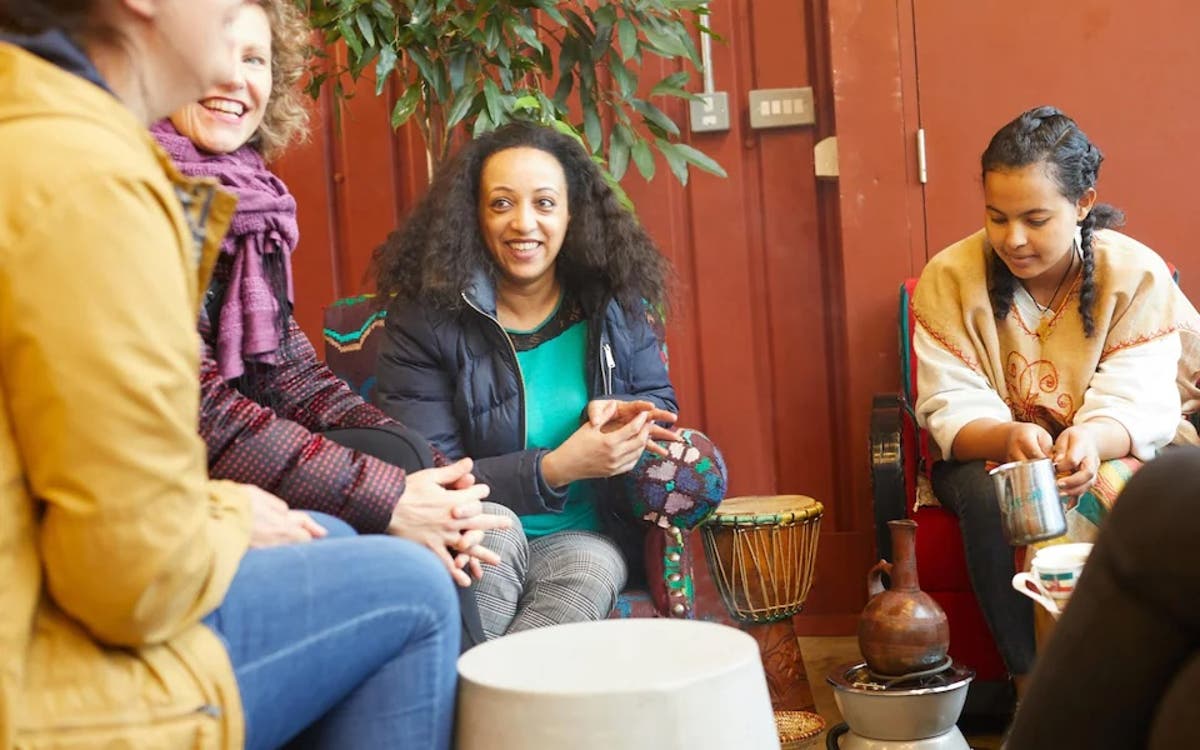Whether it’s sipping freshly ground Ethiopian coffee in Shepherd’s Bush while discovering the secret to the best brews, stumbling upon the philosophy of a new-age Persian poet, or finding an Afghan artisan with the kind of taste and talent to furnish a palace, London multiculturalism offers the kind of rich travel experiences you’ll still be banging on about at dinner parties, decades to come. But how often do we take advantage of this diversity?
Why not start planning a trip to some of the cultures thriving in the capital — no planes required. From Syria to Sri Lanka, the Philippines to the West Bank, these initiatives — created by or for asylum seekers or refugees — offer an unparalleled mix of stories, flavours and wisdom, while bringing people together in the most uplifting ways.
The Philippines via Farringdon

One of Migrateful’s most popular chefs is Tina
Migrateful
Migrateful runs some of the capital’s best cookery classes, including at a dedicated school in EC1, where refugee and immigrant chefs share their cultures by the dishful. One of the most popular is Chef Tina, who not only helps you get to grips with classic Filipino dishes such as ukoy (crunchy shrimp and vegetable fritters) and the tamarind-laced sinigang (pork soup), but also brings homespun Bulakeño favourites to the table, including the secret to her mother’s sticky coconut rice.
From Kyiv to Covent Garden
Yelyzaveta Tataryna planned to launch a vegan and gluten-free patisserie in her native Kyiv before the city was invaded. Come 2023, she was instead selling impossibly pretty pastries, including traditional sweet varenyky (dumplings) and a customer favourite tangerine tart behind a burst of pink florals in Covent Garden, alongside a team of similarly displaced Ukrainians. Don’t let the #Barbiecore fool you, though — this place is as conscious as it is photogenic. The menu changes in accordance with seasonal ingredients and they’ve done away with white sugar entirely.
Ethiopian aromas in Shepherd’s Bush

Urban Adventures
Spearheaded by Sefanit Mengiste, a Londoner born in Gondar, the historic seat of Ethiopian royalty, in conjunction with social enterprise Women Travel, this W12 taste tour of Shepherd’s Bush Market taps up the independent traders most favoured by London’s Ethiopian diaspora, over the course of two and a half hours. From medicinal ginger shots to warming misir alicha (lentil stew) mopped up with injera (fermented flatbread), the rich traditions of Addis Ababa and the lore of Lalibela are evoked flavour by flavour, bringing Mengiste’s heritage alive in west London. The jewel in the crown? A full Ethiopian coffee ceremony: a time-honoured custom during which she’ll wrap up proceedings by sharing powerful stories of childhood and community.

Imad Alarnab
If you followed your nose right up to the top of Kingly Court off Carnaby Street, you’d strike the proverbial pot of gold; in this case, bowls of pomegranate-studded baba ghanouj, piles of ghee-lashed pita, platters of tender kebabs and some of the best baklava to be found in central at Imad’s Syrian Kitchen.
Owner Imad Alarnab was displaced to refugee camps in Lebanon and Calais after losing his Damascus restaurant business to war. After rebuilding his life in London through a successful series of charitable supper clubs, Alarnab now allocates £1 from each bill at his Soho-based restaurant to Choose Love, the UK charity that supports refugees and asylum seekers with humanitarian aid, and regularly hosts fundraising cooking clubs to uplift the community meaningfully. His combination of Syrian hospitality and popular Middle Eastern flavours has proved such a hit with patrons that many order the restaurant’s namesake recipe book before they leave the table.
Hebron tapestry in the heart of Holborn

Thierry Bal
At Mimosa House, Daria Khan’s identity-focused arts charity in Holborn, a new series of tatreez workshops aims to preserve the historic embroidery technique used by Palestinian women to chart their lives and loves. Londoner Tasneem Aliewi, whose family left Ramallah during the second uprising, runs one two-hour workshop per quarter: providing homespun snacks (such as dates and pastries with fresh mint tea), as well as tatreez kits representing various regions from her childhood and ancestry. With sessions offered free of charge for attendees, Aliewi hopes to cultivate an inclusive and welcoming space for all women, allowing them to build community bonds and forge deeper connections via colourful, cross-stitched motifs.
Connect to Yemen, Myanmar, Mali and more from Columbia Road

Ishkar store front
Breaking barriers that not only isolate countries such as Iraq, Afghanistan and Burkon Faso from international trade and tourism but also perpetuate one-sided narratives, Ishkar works with NGOs, designers, and travel guides to source high-level craftsmanship. Think jewellery, clothing, rugs and homeware sold online as well as at the company’s base on flower market-famous Columbia Road to empower communities and preserve heritage through film and events.
Persian platefuls in Lewisham
A non-profit connecting refugees and locals through a shared love of good food, SE13’s Plateful Cafe (platefulcafe.co.uk) provides hospitality training and upskilling as well as either volunteering or London living wage jobs (dependent on status) for those facing barriers to employment. Led by chefs predominantly from Iran, as well as Syria, Sri Lanka and Yemen, you’ll find the borough’s best chicken shawarma and creamy ash reshteh (noodle soup) supplemented by a cultural menu of live jazz, poetry readings and community get-togethers.
Keep an eye out for neighbour, Refugee Café, selling restaurant-grade food from refugees and asylum seekers at pop-ups across south-east London, while they prepare to open a permanent site back at base. Plus, check out their website for larder refills. The Persian carrot jam is exceptional.
London-based Asylum Speakers — a collective aiming to amplify the humanity behind the headlines and statistic — gives asylum seekers and refugees a platform to tell their stories: book them as speakers for corporate events; listen to their podcast; or pick up a copy of the book to read 31 stories of migration from voices that too often go unheard.










